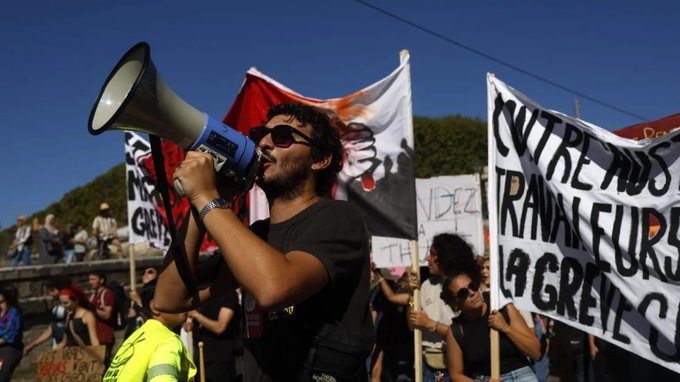Workers across France strike against budget cuts proposed for 2026, leading to large-scale disruption and social unrest. On September 18, 2025, over one million people reportedly participated in protests and strikes nationwide, reflecting deep dissatisfaction with austerity measures that sparked political tumult and widespread public anger.
Background and Cause of the Strike
The strike followed the introduction of a €44 billion ($51 billion) austerity budget plan by former Prime Minister François Bayrou aimed at reducing France’s growing public debt, which reached 113% of GDP. The measures included freezing pensions, increasing healthcare costs, and eliminating two public holidays. Bayrou lost a no-confidence vote in the National Assembly on September 8, 2025, largely due to opposition to the austerity plan. His successor, Sebastien Lecornu, has not yet announced major changes, sustaining union and public mistrust.
Labor unions denounce the proposals as brutal and unfairly targeting workers, retirees, students, and vulnerable populations. They call for scrapping austerity, increased public investment, and higher taxation on the wealthy.
Scale and Impact of Strikes
-
Estimated 1 million protesters according to the CGT union; official government estimates range from 600,000 to 900,000.
-
Over 80,000 police and gendarmes deployed nationwide, with armored vehicles and water cannons prepared.
-
Strikers include teachers, healthcare workers, public transport employees, pharmacists, and students.
-
Approximately 1/3 of public school teachers and 45% of secondary school staff on strike.
-
Pharmacies report a 98% closure rate.
-
Paris metro disrupted: multiple lines closed or running limited services.
-
EDF (national power utility) reports a reduction of 1.1 GW in nuclear power output as part of industrial action.
-
Nearly 250 separate demonstrations across the country, including blockades of schools and transport depots.
-
At least 140 arrests and 75 detentions nationwide; clashes between police and protesters occurred, especially in Paris and Lyon.
Table: Strike Participation and Impact Summary
| Sector | Participation | Impact |
|---|---|---|
| Public School Teachers | ~33% nationwide, 45% Paris | Hundreds of schools closed |
| Secondary School Staff | ~45% | Many schools operating partially |
| Pharmacists | 98% pharmacies closed | Medicine access disrupted |
| Metro/Public Transport | Severe disruption | Multiple metro lines closed or limited |
| EDF Workers | Strike-induced reduction | 1.1 GW nuclear power offline |
| Protesters | 600,000–1,000,000+ | Major cities paralysed, demonstrations |
Political and Social Context
The strikes represent the biggest challenge yet to President Emmanuel Macron’s government, which faces a legitimacy crisis with plummeting approval ratings and parliamentary instability. Macron’s government must manage the tension between fiscal discipline and social demands amid an increasingly fragmented political landscape.
Union leaders have voiced strong opposition to proposed pension reforms, tax policies, and public spending cuts, warning that the social contract is at risk. Students joining the protests highlight a narrative of lost future prospects and declining public services.
Government and Union Statements
Interior Minister Bruno Retailleau described the protests as a “hybrid” event, with peaceful union marches alongside risks of violence from radicalized groups, justifying the large police deployment. Despite some violence and arrests, the protests were largely peaceful, with many demonstrators emphasizing dignity and justice.
Unions reaffirmed their rejection of austerity, calling for engagement on alternatives that protect workers and social services. They warned continuing down the current path risks further social unrest.
Conclusion
The national strikes and protests on September 18, 2025, highlight the profound societal divisions and economic challenges facing France. The extensive participation underscores the frustration with austerity policies viewed as disproportionately harmful to ordinary citizens. This historic mobilization places intense pressure on the Macron administration and the new Prime Minister Lecornu to reconsider France’s economic strategy or face continued unrest and political instability.
The coming weeks will likely see further negotiations, potential escalation of strikes, and intense political debate over the country’s fiscal future, with workers and unions ready to resist austerity measures that threaten their livelihoods.

